 Bad breath can be caused by a number of factors. A small percentage of cases are caused by digestion problems or other internal concerns but in nearly 90 per cent of cases, it is caused by problems occurring in the oral cavity. This could be the result of poor standards of oral hygiene. Food and bacteria that are trapped in small spaces between the teeth and in the grooves of the tongue will decay and release nasty smelling sulphurous compounds, which are then expelled on the breath. This kind of bad breath can be masked by using oral products, but only temporarily. The only sure-fire cure for this kind of bad breath is to make dramatic improvements in your daily oral hygiene routine and ensure you are brushing and flossing correctly.
Bad breath can be caused by a number of factors. A small percentage of cases are caused by digestion problems or other internal concerns but in nearly 90 per cent of cases, it is caused by problems occurring in the oral cavity. This could be the result of poor standards of oral hygiene. Food and bacteria that are trapped in small spaces between the teeth and in the grooves of the tongue will decay and release nasty smelling sulphurous compounds, which are then expelled on the breath. This kind of bad breath can be masked by using oral products, but only temporarily. The only sure-fire cure for this kind of bad breath is to make dramatic improvements in your daily oral hygiene routine and ensure you are brushing and flossing correctly.
The other major cause of bad breath is gum disease. Dentists can often tell that patients are suffering from gum disease even before they have examined them properly. This is because gum disease lets out a very distinctive odour, caused by bacteria and decaying gum tissue. Gum disease is again caused buy poor standards of oral hygiene and insufficient brushing and flossing. Nearly three quarters of adults in the UK will suffer from gum disease at some point in their lives so it is definitely a problem that we all need to be concerned about.
Gum disease is usually mild, known as gingivitis, and can be cleared up with an improvement in cleaning techniques and some treatment from a Central Leeds dentist. However, if the gum disease is allowed to progress unchecked it may become the more serious periodontitis, which will certainly need more extensive treatment. As you might expect, the bad breath becomes more of a problem as the gum disease becomes more serious, so if you have noticed that you have bad breath it is always a good idea to go to the dentist for a check up to ensure the health of your gums.





 There are many conditions that affect us when we sleep. Two of the most common are snoring and sleep apnea. Both of these affect the way we sleep and can cause associated health problems during the day. Another less common but also debilitating sleep disorder is known as bruxism.
There are many conditions that affect us when we sleep. Two of the most common are snoring and sleep apnea. Both of these affect the way we sleep and can cause associated health problems during the day. Another less common but also debilitating sleep disorder is known as bruxism. Bad breath can be a very embarrassing problem, and not just for you but also for those around you. People who suffer from bad breath are also at times unaware because it can be very difficult to tell if you are suffering from the condition. This can often lead to very awkward situations where someone has to tell you your breath smells.
Bad breath can be a very embarrassing problem, and not just for you but also for those around you. People who suffer from bad breath are also at times unaware because it can be very difficult to tell if you are suffering from the condition. This can often lead to very awkward situations where someone has to tell you your breath smells. Sleep apnea is a common disorder that affects thousands of people as they sleep. It cause interruptions during breathing that leads to noises being emitted, similar to those of snoring but it is not the same condition as snoring.
Sleep apnea is a common disorder that affects thousands of people as they sleep. It cause interruptions during breathing that leads to noises being emitted, similar to those of snoring but it is not the same condition as snoring. Bad breath, also commonly called halitosis, is usually the result of poor dental hygiene but can also be the sign of wider health problems. It is frequently made worse by the foods you eat and other lifestyle habits such as smoking.
Bad breath, also commonly called halitosis, is usually the result of poor dental hygiene but can also be the sign of wider health problems. It is frequently made worse by the foods you eat and other lifestyle habits such as smoking. It is a fact that people with diabetes are more likely to be suffering from periodontal disease, also known as gum disease, as people who do not have the condition. This is mainly because diabetes affects the immune system making sufferers more likely to catch infections. Periodontal disease is widely considered to be the sixth complication of diabetes by healthcare professionals.
It is a fact that people with diabetes are more likely to be suffering from periodontal disease, also known as gum disease, as people who do not have the condition. This is mainly because diabetes affects the immune system making sufferers more likely to catch infections. Periodontal disease is widely considered to be the sixth complication of diabetes by healthcare professionals. Sleep apnea is a condition that affects breathing during sleep. Often confused with snoring which is the sound of breathing during sleep, apnea is the actual cessation or interruption of breathing which often causes a choking, snore-like sound. Because apnea happens during sleep, many people who have the condition are unaware, unless they have been told by a loved one or friend about their problem.
Sleep apnea is a condition that affects breathing during sleep. Often confused with snoring which is the sound of breathing during sleep, apnea is the actual cessation or interruption of breathing which often causes a choking, snore-like sound. Because apnea happens during sleep, many people who have the condition are unaware, unless they have been told by a loved one or friend about their problem. causes the actual cessation of breathing during sleep. It has two main causes which have led to two distinct varieties of the disease. The most common is known as obstructive sleep apnea and is caused in the throat when soft palate tissue collapses, momentarily blocking the airway and causing the patient to emit a choking-like sound. Apnea is often confused with snoring because the sounds are not dissimilar even though snoring is the sound of breathing when asleep.
causes the actual cessation of breathing during sleep. It has two main causes which have led to two distinct varieties of the disease. The most common is known as obstructive sleep apnea and is caused in the throat when soft palate tissue collapses, momentarily blocking the airway and causing the patient to emit a choking-like sound. Apnea is often confused with snoring because the sounds are not dissimilar even though snoring is the sound of breathing when asleep.

